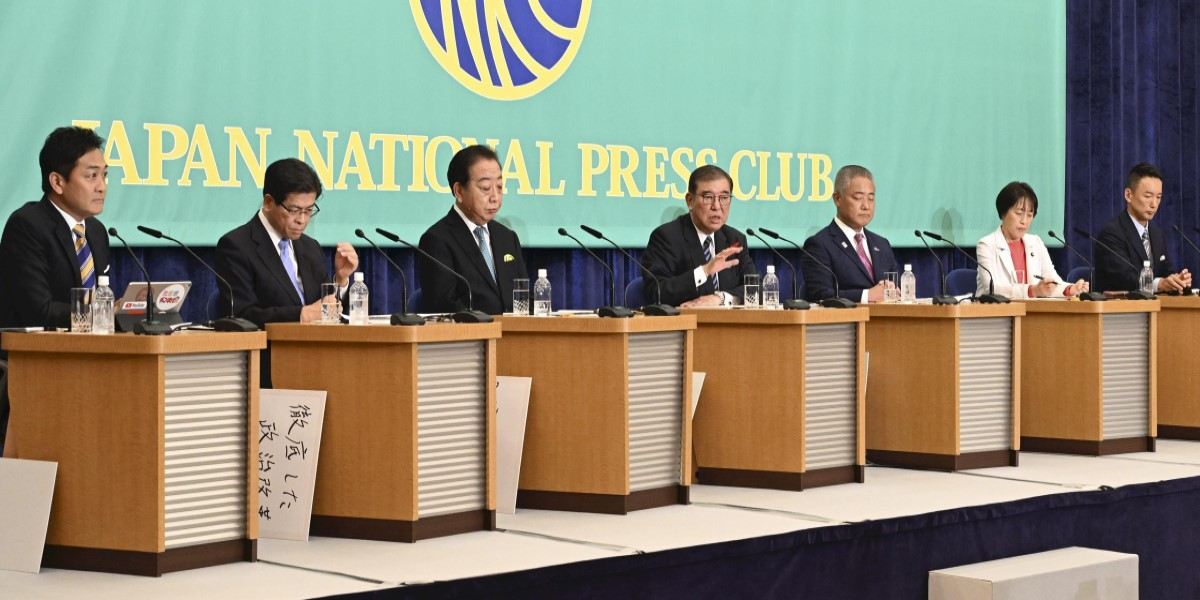Japan Prime Minister Dodges Criticism During Leaders Debate; Takes Cautious Stance on Revising Japan-U.S. Pact

The leaders of seven political parties, including Liberal Democratic Party President Shigeru Ishiba, center, participate in a debate hosted by the Japan National Press Club in Tokyo on Saturday.
17:41 JST, October 13, 2024
Prime Minister Shigeru Ishiba demonstrated his committment to his political views during a recent inter-party debate at the Japan National Press Club in Tokyo but also dodged numerous questions, saying he would continue to discuss certain issues within his Liberal Democratic Party.
The leaders of seven ruling and opposition parties met for the debate on Saturday ahead of the Oct. 27 general election. Opposition party chiefs questioned Ishiba, who is also the president of the LDP, about security and political reform.
“We’ll discuss how we can move forward step by step within the party, and we’ll also continue to discuss this with other parties,” Ishiba said in response to Japan Innovation Party leader Nobuyuki Baba. The latter had pressed the prime minister about whether his long-held determination to revise the Japan-U.S. Status of Forces Agreement was weakening. Ishiba also advocated revising the agreement during last month’s LDP presidential election.
Although Ishiba has not changed his intention to revise the pact, he indicated Saturday that he would leave the matter to party discussions for the time being, as it is not something that can be immediately achieved. During the Saturday debate, the prime minister also used the same argument regarding his idea of creating an Asian version of NATO.
Baba criticized Ishiba’s “change of stance,” saying, “[Ishiba] is greatly deviating from the expectations of the people, who are looking to him to actively take the initiative as a leader.”
Nuclear umbrella
The debate lasted over two hours, including an about 40-minute period in which party leaders asked each other questions. Eight of the 10 questions posed by the leaders of the five opposition parties were directed at Ishiba, but his responses were highly cautious.
During the LDP presidential campaign, Ishiba said that Japan’s participating in a meeting of states parties to the Treaty on the Prohibition of Nuclear Weapons as an observer was an “option.” However, when Constitutional Democratic Party of Japan leader Yoshihiko Noda pressed Ishiba to participate, the prime minister said only: “[Nuclear] deterrence is functioning. I want to deepen discussions about how we can link this to nuclear abolition in the future.”
In addition to the CDPJ, the JIP, the Japanese Communist Party and Komeito also want Japan to participate as an observer. However, Ishiba apparently made the remark because the nuclear threat from China, Russia and North Korea is increasing and there is a common understanding within the government and the LDP that the U.S. nuclear umbrella is essential.
In light of the issue of money in politics, including the scandal over LDP factions’ violation of the Political Funds Control Law, the ruling party has vowed in its campaign pledges for the House of Representatives election to “abolish in the future” funds that parties provide to their lawmakers for political activities.
During the Saturday debate, Democratic Party for the People leader Yuichiro Tamaki urged the prime mbrinister to pledged that the LDP will not use the funds during campaigning for the lower house election. But Ishiba brushed Tamaki off, saying only, “We won’t use the funds in any way that is illegal or even suspected of being illegal.”
Tamaki commented sarcastically on the fact that the LDP is expected to spend a huge amount of political funds on the election campaign. “When racing a 100-meter sprint, the LDP is running 30 meters ahead. We can never catch up,” he said.
During the question and answer session with the organizers, Ishiba was asked, “Do you feel any ethical guilt?” The prime minister admitted that he did.
During the LDP presidential campaign, the prime minister indicated a positive stance on legalizing a system to allow married couples to choose different surnames. However, Ishiba took a cautious stance during the Saturday debate.
When he was asked, “Will you keep saying for decades that there hasn’t been enough discussion?” Ishiba responded: “We’ll reach a conclusion. We won’t drag this out forever.”
However, the prime minister also said, “We’re a democratic party, so if there’s opposition I won’t push past it,” showing that he was taking into account the cautious views within the party.
Top Articles in Politics
-

Japan PM Takaichi’s Cabinet Resigns en Masse
-

Sanae Takaichi Elected Prime Minister of Japan; Keeps All Cabinet Appointees from Previous Term
-

Japan’s Govt to Submit Road Map for Growth Strategy in March, PM Takaichi to Announce in Upcoming Policy Speech
-

LDP Wins Historic Landslide Victory
-

LDP Wins Landslide Victory, Secures Single-party Majority; Ruling Coalition with JIP Poised to Secure Over 300 seats (UPDATE 1)
JN ACCESS RANKING
-

Producer Behind Pop Group XG Arrested for Cocaine Possession
-

Japan PM Takaichi’s Cabinet Resigns en Masse
-

Japan Institute to Use Domestic Commercial Optical Lattice Clock to Set Japan Standard Time
-

Man Infected with Measles Reportedly Dined at Restaurant in Tokyo Station
-

Israeli Ambassador to Japan Speaks about Japan’s Role in the Reconstruction of Gaza





















